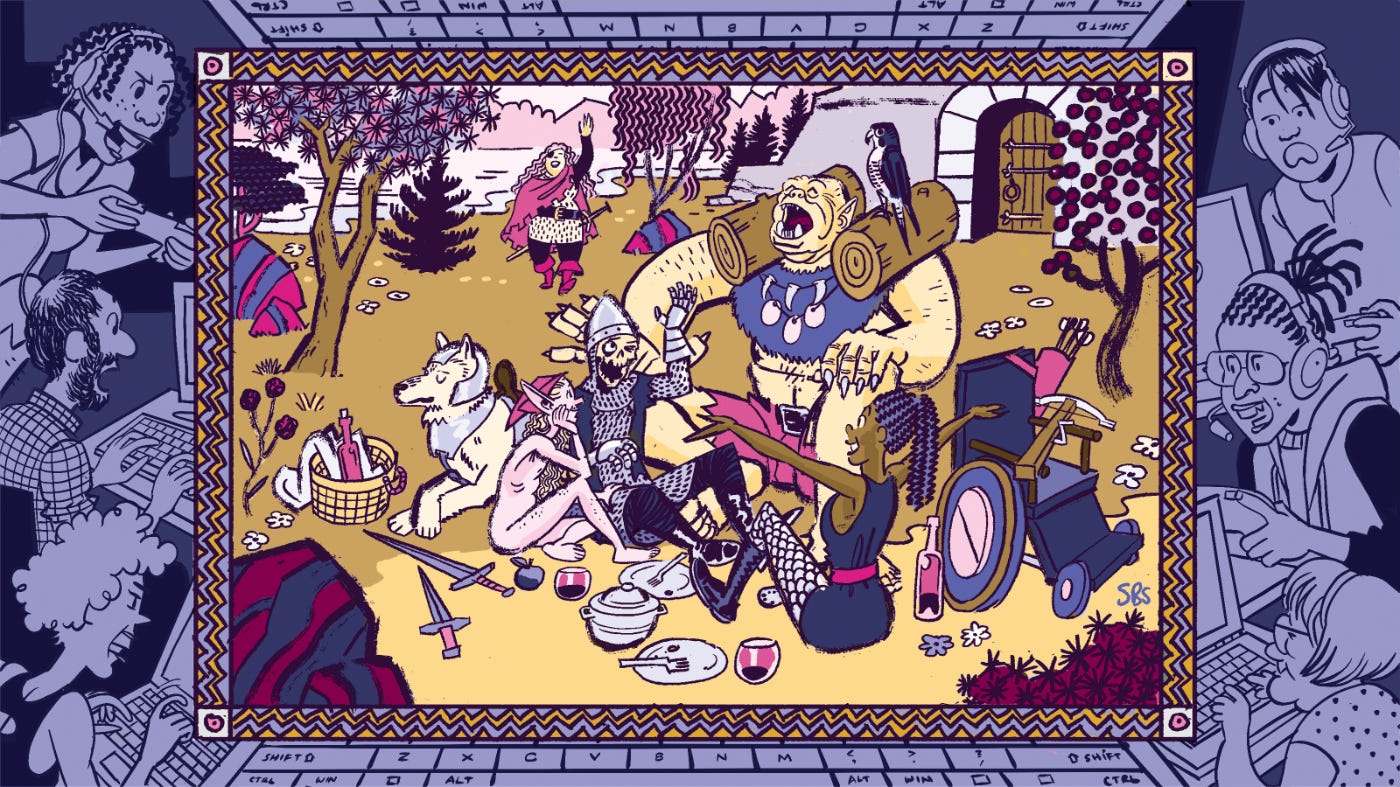Liberation in the Western Plaguelands
I felt like queer content in a machine. Could I be something else?
I know exactly where I first experienced digital liberation, although my memory is entirely in the virtual; I can’t remember where I was sitting or what time of day it was, but this is true of most of my memories playing World of Warcraft. What I do remember is that we traveled the old fashioned way, on wolves, along the old roads where the undead prowl the hills and a sinister haze lingers in the air. We arrived at a great lake, and at the center of it stood an island and a ruined city called Caer Darrow, cast in the crimson shadows of the Western Plaguelands. We were there to tell a story.
I was still in high school, and WoW was a place I found respite in when other parts of my life were in rougher shape. By chance, I had seen a recruiting post on WoW’s forums for a new guild called the Dragonmaw Vanguard, and after attending some in-game public events, I joined. We were, among other things, a role-playing guild, meaning we collaboratively crafted deep and elaborate narratives for our characters, often spanning whole continents and worlds. Our guild also self-governed in a unique way; we took turns handing off one of roughly twelve administrator council positions, each managing various guild needs, from finance to battleground tactics, and of course, our guild’s collective lore.
The journey to Caer Darrow was one of the first times I had been invited into the story-making process. It felt empowering: a kind of permission to be myself, with strangers in a strange place. It was in the aftermath that I remember one of the others messaging me to ask if my character might be gay. I said he was (which was easier than saying I was—I had not yet come out). They were elated at this, and said their character was queer as well, and so we began to plan the next chapter. From then on, by crafting stories with the community we built, I began to find my true self in a fantasy world; I began reaching toward freedom.
Now a decade has passed since my time inhabiting the world of Warcraft, and I’ve been reflecting on what that experience meant, wondering if that feeling of digital liberation is still possible. These days, my work in media and technology policy is concerned with the societal harms caused by tech giants, which seem to have become inescapable parts of our lives. These platforms have changed the social experience of the internet radically, including the queer experience. Certainly I, and many of my friends, delight in the endless flows of queer content on these giant platforms. It is easy to feel seen by mainstream culture, and to identify this feeling as something akin to liberation. But are amplification and representation enough? Liberation requires more—community, and care, and growth, and change.
Being queer and online, I often have a front-row seat to the floods of hate and abuse against queer people on platforms like Facebook, YouTube, Twitter, and others. I’m hesitant to generalize what I see anecdotally, but a series of reports in the last year from organizations including GLAAD in the US, Galop in the UK, and the Anti-Defamation League, have shown the horrifying extent of this online harm. Particularly distressing is the abuse toward LGBTQ+ youth, who face the highest suicide ideation and attempt rates among youth demographic groups, according to the Centers for Diesease Control and Prevention. As these platforms continue to grow, I wonder whether we have essentially automated despair and trauma.
When I scroll through social media, I feel more like a serf in a feudal system, planting and harvesting that ephemeral substance: content.
It’s no revelation that these platforms were not built for us, are not governed by us, and do not truly serve us. But they have captured us. In the medieval fantasy world of WoW, ironically, our guild was collectivist—we shared responsibilities, resources, decisions—in order to co-create on our own terms, in our own ways. But when I scroll through social media, I feel more like a serf in a feudal system, planting and harvesting that ephemeral substance: content. I’ve noticed how rare it is now that I ever make decisions with other people on social platforms, much less practice self-governing. I see most of my friends as their content, and I, too, feel more like queer content in a machine. Can I become something else?
It was another invitation that helped me find clues to a path forward. A friend had brought me into her book club on “eroding capitalism,” and we happened to choose The Dispossessed, Ursula K. Le Guin’s novel about an “ambiguous utopia.” Le Guin, who passed away in 2018, was a novelist more than an activist; yet her stories often reflected upon the ethical failures of our society, and what might be necessary to change. In The Dispossessed, anarchists have abandoned their capitalist planet, Urras, and established a colony on its barren moon, Anarres. The new society is built without property and governed by decentralized organizations (syndicates). But in the years since its revolutionary exodus, Anarres has slowly started to resemble the brutal society it rebelled against: more central control, less tolerance, more violence.
Anarres reminded me of the internet: both promised a radical break from the political structures of the past. I thought of how the late lyricist and internet activist John Perry Barlow famously declared the independence of cyberspace: “Governments of the Industrial World, you weary giants of flesh and steel, I come from Cyberspace, the new home of Mind. On behalf of the future, I ask you of the past to leave us alone.”—and how he later recognized his naiveté, remarking “We all get older and smarter.” Like Anarres, the internet revolution has faltered. It, too, has become more centralized, less tolerant, and more violent.
Le Guin contended that even within a society founded on principles of liberation and solidarity, there would still be a need to forge alternatives. The protagonist of The Dispossessed is Shevek, a physicist in Anarres whose scientific pursuits are being stifled by the increasingly close-minded society. Deeply worried for his home yet reluctant to elevate himself above others, Shevek chooses to peacefully rebel, and with his friends creates the Syndicate of Initiative, a collectivist organization dedicated to revitalizing free thought; a revolution within a revolution. With the help of the Syndicate, Shevek is able to crack the code to create a technology, owned by no one, that can instantly communicate across the stars; he calls it the Ansible.
I wonder if we could revitalize the internet with similar acts of rebellion. I don’t think they need to be big. Our guild, after all, was a kind of syndicate: an entirely online community we built and governed on our own terms. We did so while operating within a harsh capitalist structure—World of Warcraft, and its developer, Blizzard Entertainment, have never been beacons of tolerance and inclusion. But that doesn’t mean we couldn’t build something radically different and good.
If we are to imagine liberation in the age of massive tech platforms, the path forward cannot be more digital empires and domination; it must be anti-authoritarian and communal. I’ve found new rebellious projects, perhaps each a Syndicate of Initiative in its own way, that give me hope. The social app Lex is designed to “connect queer lovers and friends” while holding strong community ethics. Cuties, which started as a cafe but closed its doors during the pandemic, has evolved into a virtual community project to “provide resources and joy to the LGBTQIA+ community, giving special focus and attention to queer, trans, and gnc BIPOC.” Scuttlebutt is a decentralized protocol (like HTTP or RSS) for building social networks and communities free from corporate control. #ResistJam was an online game jam I got involved with in 2017 about “creating games that resist oppressive authoritarianism in all its forms.” These projects aren’t going to, say, overthrow Facebook anytime soon, and that’s not their purpose—but they are demonstrations of how we could get free, and they deserve to be supported and recognized for it. They are showing the way.
There is another scene in The Dispossessed that serves as a warning. Shevek meets a woman named Keng, an ambassador originally from Earth. We learn that her world—our world—has become an impoverished husk of itself, beset by a ruined climate and war. Contemplating the fate of Earth, Shevek asks, “Then Anarres, as you heard me speak of it—what would Anarres mean to you, Keng?” Keng replies: “Nothing. Nothing, Shevek. We forfeited our chance for Anarres centuries ago, before it ever came into being.”
A small invitation from a stranger in World of Warcraft was what set everything else into motion for me, allowing me to take my first steps toward finding myself, and building something liberating. We can still make similar invitations to people around us to build a better internet. The alternative is inaction. Unfortunately, inaction does not mean nothing happens; it means something else happens. The choice is ours. 🌳
Erik Nikolaus Martin works across several public-interest policy and technology areas. He has advised organizations including Democracy Fund and the Federation of American Scientists, served in the White House Office of Science and Technology Policy, and managed education programs at the game development software company Unity.
Illustration by Sam Sharpe.





